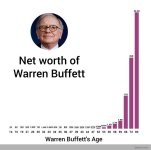Carl_NH
Elite Member
- Joined
- Apr 5, 2002
- Messages
- 4,187
- Location
- Coastal NH
- Tractor
- 01 Kubota B21TLB, 2010 Ferris 52" ZTR, Cub Cadet 1811, Gravely Super8
A
I am smart enough to make money, but not smart enough to understand bitcoin.
I am not smart enough to invest....so leave that to Fisher Investments
We've got accounts with Vanguard and my 401K with my employer, and I've been speaking with Fisher and they want me to roll both these accounts over to them - I am 65 and plan to retire in 3 years as I enjoy what I do. Vanguard has returned on average 7.5% over the last 5 years, moderate/conservative with 55/45 stocks/mutual funds, and the 401K is similar 55/45 split returning on average 9-10% - last year was 17% which was the exception.
Bottom line Fisher is claiming with their actively managed approach they can return 10% after fees (1.2%)whereas Vanguard fees are around .4% and the 401K .8%. My wife wants to put everything in Vanguard so we are just investigating options.
What's your history and experience with Fisher? Do they live up to their claims?

